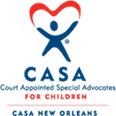
Health
If you have symptoms, Oschner has a free COVID-19 info line where you can talk to a nurse at 844.888.2772; source: https://www.ochsner.org/coronavirus. They also offer virtual visits (not free); for information visit https://www.ochsner.org/ochsner-anywhere-care.
The mobile testing sites run by the city have been replaced by two Ochsner operated two COVID19 drive-thru testing sites in New Orleans – at Algiers and Lake Terrace Health Centers. Source, details: https://www.ready.nola.gov/ochsner
A third drive-thru site is located at the Alario Center on the Westbank, operated by the Jefferson Parish Emergency Management Department. Source, details: https://www.jeffparish.net/press-releases/covid-19-drive-through-testing-site-available-to-any-symptomatic-individual-18/03-25-yyyy
Bicycles and cars can both drive through the testing site at Odyssey House from 3:00-5:00 PM, Monday through Friday. Details, source: https://www.ohlinc.org/covid19
West Jefferson Medical Center is now a mobile testing site. To use the new service, call the LCMC Health COVID-19 hotline at 504.962.6202. between 9:00 AM and 5:00 PM. If the screeners determine that you need further evaluation, you will be directed to visit the screening center. You cannot show up at the drive-through screening center without first calling the hotline. Source:https://www.bizneworleans.com/drive-through-virus-screening-now-at-west-jeff/
Additional mobile testing sites are being piloted in Orleans with specific qualifications. Source, details, locations: https://ready.nola.gov/testing/
What coronavirus means for pregnancy and other things new and expecting mothers should know: https://www.propublica.org/article/coronavirus-and-pregnancy-expecting-mothers-q-and-a
Physical Health
If you need emergency food assistance, Second Harvest locations can be found by calling 211; source: https://no-hunger.org/covid-19/. Seniors can also sign up for delivery.
If you are in need of diapers or period products, the Junior League of New Orleans is now distributing in the community. Source, locations: https://www.jlno.org/community/diaper-bank/
If you are elderly or homebound and in need of food delivery, NOLA Tree Project can help. Please contact Connie Udo, connie@nolatreeproject.org. Source: https://www.instagram.com/p/B92QkK_FRfz/
If you are in need of diapers, the Junior League of New Orleans’ diaper bank is now distributing in the community. Source, locations: https://www.instagram.com/p/B97W9telGRV/
For grandfamiles or in multi-generational families it is nearly impossible for older caregivers to distance themselves from the children they are raising. Generations United has developed a fact sheet that includes up-to-date information about the virus, risks for older adults and children, suggestions for staying connected and selfcare, and accessing essential resources. Source: https://www.gu.org/app/uploads/2020/03/COVID-19-Fact-Sheet-3-17-20.pdf
In communities experiencing disaster, child abuse and neglect may increase in frequency and severity. Families often face a wide range of emotional, psychological, and practical stressors in disaster situations. Parents may experience anger, frustration, and grief, as well as disrupted housing, employment, and social supports. These disruptions may increase the risk of child abuse and neglect. Parents and caregivers, take care of yourselves using the mental and emotional health resources below and tools like this one: https://www.scanva.org/wp-content/uploads/2019/04/2019SelfCare_English.pdf.
If you suspect abuse or neglect of a child, call 855.4LA.KIDS (855.452.5437) toll-free, 24 hours a day, 365 days a year. All calls are confidential.
Additional information, sources: https://dcc.missouri.edu/assets/doc/dcc_child_abuse_and_disasters.pdf, https://www.scanva.org/support-for-parents/parent-resource-center-2/self-care-for-parents/, http://www.dcfs.louisiana.gov/page/reporting-child-abuse-neglect.
When domestic violence survivors are forced to stay in close proximity to their abuser, it can create circumstances where their safety is compromised, and they may need to alter their safety plan. If you are co-quarantined or self-isolating with an abuser in a dangerous home situation, you are not alone. The National Domestic Violence Hotline can be reached 24/7 at 800.799.7233, TTY 800.787.3224, through chat at thehotline.org, or by texting LOVEIS to 22522.
Mental and Emotional Health
It is common to feel stress symptoms before or after a crisis. Most stress symptoms are temporary and will resolve on their own in a fairly short amount of time. However, for some people, particularly children and teens, these symptoms may last for weeks or even months and may influence their relationships with families and friends. Learn the warning signs here: https://www.samhsa.gov/find-help/disaster-distress-helpline/warning-signs-risk-factors
The Louisiana Department of Health has created the Keeping Calm Through COVID crisis phone line which provides trained, compassionate counselors to support Louisianans through this difficult time. Counselors are available 24 hours a day, seven days a week with information and service coordination, linking callers to mental health and substance abuse counseling services. Call the free hotline at 1-866-310-7977 at any time, 24 hours a day, seven days a week. All calls are confidential. Source: http://www.ldh.la.gov/index.cfm/newsroom/detail/5492
The Disaster Distress Helpline is a 24/7, 365-day-a-year, national hotline dedicated to providing immediate crisis counseling for anyone experiencing emotional distress related to disasters, including infectious disease outbreaks. You may call for yourself or on behalf of someone else. Dial 800.985.5990 or text TalkWithUs to 66746 to connect with a trained crisis counselor. Source: https://www.samhsa.gov/find-help/disaster-distress-helpline
The Bureau of Family Health has compiled a list of helpful, go-to mental health resources geared toward individuals and families who are pregnant and/or parenting infants and young children: https://partnersforfamilyhealth.org/mental-health-resources-families-coronavirus-outbreak/
Tips for social distancing, quarantine, and isolation during an infectious disease outbreak can be found here: https://store.samhsa.gov/system/files/sma14-4894.pdf and here: https://www.samhsa.gov/sites/default/files/tips-social-distancing-quarantine-isolation-031620.pdf
Resources for dealing with anxiety can be found here: https://adaa.org/finding-help/coronavirus-anxiety-helpful-resources
Eight tips for dealing with financial stress during the pandemic can be found here: https://www.cnbc.com/2020/03/16/how-to-cope-with-coronavirus-related-financial-stress-and-anxiety.html
We can all help prevent suicide. The National Suicide Prevention Lifeline provides 24/7, free and confidential support for people in distress, prevention and crisis resources for you or your loved ones, and best practices for professionals. Call 800.273.8255, or chat through their website. Source, details: https://suicidepreventionlifeline.org/

